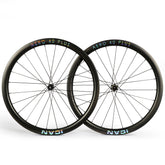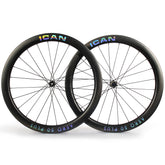Why disc brakes instead of rim brakes?
Rim brakes have been around in the bicycle industry for a very long time and are an option for most riders around the world. However, nowadays the use of disc brakes in road bikes has gained a lot of popularity. The latest selection of road bikes follows this trend compared to the conventional "old" trend of rim brakes. Recently the UCI stopped experimenting with disc brakes, but then Kittel popularized them by becoming the first sprinter to win a stage with disc brakes. More and more racing bikes with disc brakes are being brought onto the market. Although disc brakes have gained a lot of prominence, rim brakes are still an option for cyclists on a budget. The notable difference between the two rims is that rim brakes use a cable system while disc brakes use a hydraulic system. In this article you will learn everything about disc brakes and why you should definitely choose them over rim brakes for a racing bike.
Types of disc brakes

There are two known types of disc brakes on road bikes. These are hydraulic and mechanical. Both have one thing in common: they have pistons whose main function is to press the brake pad onto the rotor. However, the difference between the two types lies in how the force is applied when braking. Mechanical disc brakes are not much different from rim brakes as they rely on cables to facilitate the braking process. Hydraulic disc brakes, on the other hand, use a fluid to support the braking process. Mechanical disc brakes are cheaper, but hydraulic disc brakes are even better.
Better braking performance
Disc brakes improve the braking performance of road bikes, especially in wet and rainy weather. This is because the brakes are protected from the wet weather depending on their position. It also helps in eliminating a certain terrible noise that is heard when the calipers in rim brake bikes come into contact with your bike rims. Disc brakes require very little lever force to bring the bike to a stop. This is important because the rider does not have to tense their muscles, which reduces muscle fatigue. It is also important that disc brakes cannot become clogged with mud when driving on muddy terrain or in the rainy season. This type of brakes are durable, i.e. h. they are not affected by bad weather, either extremely wet or dry.
Disc brakes have better brake modulation, which means braking is easier and the rider can apply the correct and required force to brake. It is also important to note that you can adjust the disc brake to ensure an even better, if not the best, braking experience. The adjustment is made by increasing the diameter of the brake discs. The larger the rotor, the stronger the brake. A powerful brake gives the driver confidence and allows them to go faster regardless of the terrain.
space for wider tires
You can easily equip your bike with taller and wider tires of up to 32mm compared to the 28mm rim brake version. Wider tires are important because they ensure better traction and rider comfort. Larger and wider tires absorb vibrations that occur when the biker rides over rough surfaces and bumps. This way you can ride your bike for hours without getting tired or feeling uncomfortable. Wider tires improve bike handling, comfort, grip and control. Besides, the presence of wider tires also means that it is wider and has enough space for installing mudguards, which comes quite in handy during the rainy and winter seasons. A bike with wider tires can handle any terrain from smooth to rocky and bumpy.

durability
Road bikes that are equipped with and use disc brakes are typically more durable than those equipped with rim brakes. When it comes to durability, we focus on the wheels. The wheels become durable because there is no friction on the rim that can cause wear. The wheels of bicycles with rim brakes are prone to rapid wear due to the heat and friction created when the caliper comes into contact with the rim each time you brake. The bottom line is that disc brakes ensure that your wheels are durable compared to rim brakes.
Cost
Another reason why you should choose disc brakes over rim brakes is the cost. Yes, initially it is expensive to purchase the brake disc bikes, but that is understandable because of the technology that has been put in place. However, disc brakes are cheaper to maintain than rim brakes. From time to time you will need to replace your rim and rubber brake calipers due to wear on the brake rails.
heat dissipation
When you ride your bike, it is normal to brake from time to time, perhaps to avoid a collision or to stop. When you use rim brakes, the constant friction between the rim and the calipers creates a lot of heat. This can lead to wear and tear of the wheel, especially the rims. It can also result in a loss of braking power. Unlike rim brakes, disc brakes do not generate heat, a reason why they are durable and preferred by most people.





